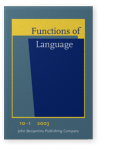Vol. 10:1 (2003) ► pp.1–30
Negotiating identity
The interpersonal functions of wh-clefts in English
This study investigates the interpersonal functions of basic and reversed wh-clefts extracted from the Freiburg LOB corpus of written English (FLOB). It shows that, within the framework of appraisal (Martin 2000, White 2001), wh-clefts function in the heteroglossic system of engagement. They allow writers to acknowledge the existence of divergent positions in the text. At the same time they are dialogistically contractive. They close down discussion by expressing the authorial position in preference to all other alternative positions. This rhetorical strategy increases the argumentative force of the authorial position. Basic wh-clefts tend to express newsworthy, often contrastive, authorial positions, whereas reversed wh-clefts tend to negotiate, confirm and sometimes challenge already established authorial positions.
Cited by
Cited by 5 other publications
This list is based on CrossRef data as of 2 july 2024. Please note that it may not be complete. Sources presented here have been supplied by the respective publishers. Any errors therein should be reported to them.
